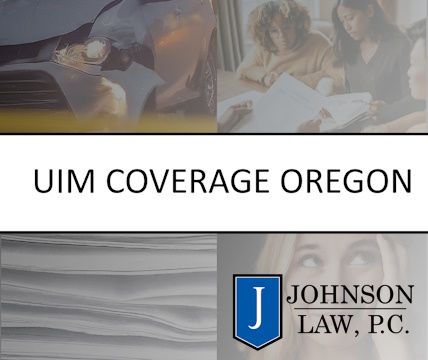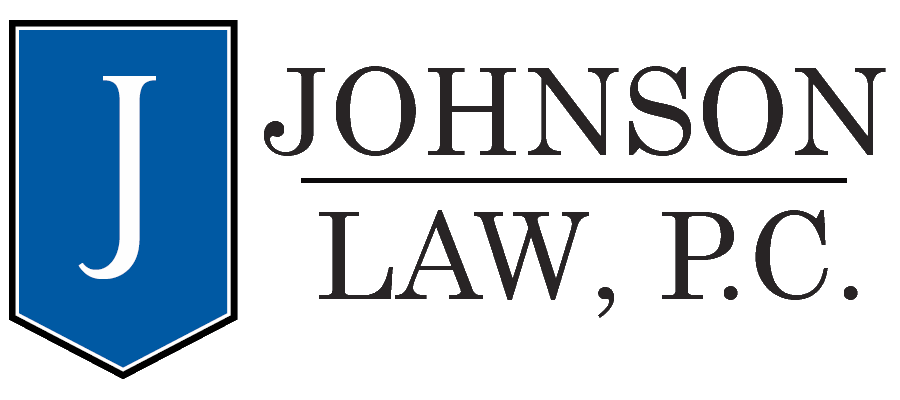UIM Coverage in Oregon
In the unpredictable realm of road travel, the risk of encountering a driver with insufficient insurance coverage is a reality that can lead to significant financial and emotional burden. In Oregon, Uninsured/Underinsured Motorist (UIM) Coverage emerges as a crucial safety net, offering protection when the unexpected strikes. This blog post aims to demystify UIM coverage in Oregon, highlighting its importance and providing guidance on navigating these waters effectively.
Quick Links

What is UIM Coverage?
UIM Coverage in Oregon is an insurance provision designed to protect you in the event that you are involved in an accident with a driver who either lacks insurance or has insufficient coverage to compensate for your damages. In Oregon, this coverage is not just a recommendation; it's a legal requirement as part of your auto insurance policy.
Note: The contents of this post are not legal advice and are for educational purposes only. If you need help with a legal matter please consult with a qualified attorney. We offer free consultations for personal injury cases.
We will review your case for free.
Pay us nothing unless we get you a better settlement.
We work on contingency.
Oregon's Insurance Requirements and UIM Coverage
In Oregon, the law mandates that every auto insurance policy includes UIM coverage. This ensures that if you're involved in an accident with an underinsured driver, your policy will help cover medical expenses, lost wages, and other damages. Understanding the nuances of these requirements can significantly impact how you approach your insurance coverage and what you can expect in terms of protection.
Minimum Insurance Requirements
As per Oregon.gov:
In Oregon, it is illegal to drive without liability coverage. See ORS 806.010.
The minimum insurance a driver must have is:
- Bodily injury and property damage liability
- $25,000 per person;
- $50,000 per crash for bodily injury to others; and
- $20,000 per crash for damage to others’ property.
- Personal injury protection
- $15,000 per person.
- Uninsured motorist
- $25,000 per person; and
- $50,000 per crash for bodily injury.
You must give your insurance policy number every time you register a vehicle, or when you buy a light vehicle trip permit.
The Limitations of Minimum Coverage
While Oregon law requires all drivers to have a minimum amount of insurance, these limits ($25,000 per person and $50,000 per accident for bodily injury) may not be sufficient in serious accidents. This gap is precisely where UIM coverage becomes indispensable, offering a buffer that could be the difference between financial stability and hardship following an accident.
Policy Stacking in Oregon
A significant development in Oregon's approach to UIM coverage involves the stacking of multiple UM/UIM policies. Contrary to the previous stance, a recent ruling by the Oregon Supreme Court now permits policyholders to combine the limits of multiple UM/UIM policies issued by the same insurer. This change offers greater potential compensation for individuals involved in accidents with underinsured motorists. Policyholders should review their insurance policies and consider consulting with their insurance agents or legal advisors to understand how this ruling might benefit them in the event of an accident.
Filing a UIM Claim in Oregon
Navigating a UIM claim can be complex. In Oregon, the process typically involves proving that the at-fault driver's insurance is inadequate and then filing a claim under your own UIM policy. This process can be intricate and may require legal expertise to ensure that you receive the full benefits of your coverage.
The Role of Personal Injury Attorneys in UIM Claims
At Johnson Law, our expertise in handling UIM claims in Oregon is a cornerstone of our practice. We guide our clients through the intricacies of these claims, ensuring that they understand their rights and the legal processes involved. Our goal is to secure the compensation that our clients are entitled to under their UIM coverage, mitigating the trauma and financial strain that can follow a road accident.
Expanding Your UIM Coverage
Given the limitations of minimum coverage and the prohibition of policy stacking in Oregon, it’s prudent to consider expanding your UIM coverage. This expansion can provide a broader safety net, ensuring that you and your loved ones are adequately protected in the event of an accident with an underinsured driver.
The Importance of Being Informed and Prepared
Understanding and effectively utilizing UIM coverage in Oregon is crucial for all drivers. At Johnson Law, we are committed to providing our clients with the knowledge and legal assistance necessary to navigate these complex issues. If you’ve been in an accident and need guidance on UIM coverage or any other aspect of personal injury law, contact us for a free consultation.
Resources and Other Information
Our law firm provides free consultations for personal injury cases. Please call us about your Oregon or Washington case if you have questions.
FAQ - Oregon Insurance Minimums
What is Bodily injury and property damage liability?
What is Bodily injury and property damage liability?
Bodily injury and property damage liability is a type of insurance coverage that helps protect you if you're found legally responsible for an accident that causes physical harm to another person or damage to their property. Here’s how it works in simple terms:
- Bodily Injury Liability: If you're involved in, say, a car accident, and someone else is injured because of your actions, this part of your insurance would help cover their medical expenses, lost wages if they can't work due to their injuries, and potentially legal fees if they decide to sue you. It’s about helping to pay for the costs related to someone else’s injuries.
- Property Damage Liability: This part comes into play if you damage someone else’s property—like if you accidentally drive into someone’s fence, or bump another car. It would help pay for the repairs to fix whatever you damaged, not your own stuff, but the other person's.
Here's why it's useful: Without this insurance, you might have to pay these costs out of your own pocket, which can get very expensive, very fast. It’s a way of protecting yourself financially, ensuring that an accident doesn’t drain your savings or put you in debt.
Think of this insurance as your financial shield. It’s there to absorb the costs of accidents so that a moment’s mistake doesn’t upend your financial stability. It’s not just about complying with the law (since most places require you to have this insurance to drive); it’s about giving you peace of mind every time you’re out and about.
What is Personal Injury Protection (PIP)?
Personal Injury Protection (PIP) is a type of car insurance coverage that acts as a financial safety net for you and your passengers after a car accident, regardless of who is at fault. Here's a straightforward explanation:
- What It Covers: PIP helps pay for medical expenses for you and your passengers after an accident. But its support doesn't stop there; it can also cover lost wages if you're unable to work due to your injuries, and other related expenses, such as childcare or household help if your injuries prevent you from performing these tasks.
- Why It’s Useful: PIP offers immediate coverage for medical expenses and other related costs, helping you avoid the financial strain that can follow an accident. Since PIP works no matter who caused the accident, you don't have to wait for insurance companies to determine fault before receiving benefits. This means you can start your recovery process sooner without worrying about upfront costs.
- Unique Aspect: Unlike traditional liability insurance, which pays out to the other party when you’re at fault, PIP is there to ensure that your own costs are covered up to your policy's limits. This coverage is particularly valuable in "no-fault" states, where drivers are required to seek compensation from their own insurance regardless of who caused the accident.
In essence, Personal Injury Protection provides a layer of financial security, covering essential expenses and helping you focus on recovery without the added stress of immediate financial burdens. It’s a crucial component of your insurance policy, designed to offer quick and effective support when you need it most.
What is an Uninsured Motorist?
An uninsured motorist is a driver who does not have auto insurance coverage. In the context of auto insurance policies, there are specific coverages designed to protect you if you're involved in an accident with such a driver. Here's a clear breakdown:
- Why It Matters: If you're hit by a driver who doesn't have insurance, you might worry about how to cover the costs of your injuries or the damage to your vehicle, especially if the other driver can't afford to pay out-of-pocket. This is where uninsured motorist coverage comes into play.
- What It Covers: This type of coverage is designed to step in and cover medical expenses for you and your passengers, and sometimes even damages to your vehicle, in the event that you're in an accident with an uninsured driver. It acts as a stand-in for the insurance the other driver should have had, ensuring you're not left to handle the financial fallout on your own.
- Benefits: The key benefit of having uninsured motorist coverage is peace of mind. Knowing that you're protected even in situations where another driver is breaking the law by not having insurance means one less thing to worry about if you ever find yourself in an accident. It also helps ensure that you won't be facing large out-of-pocket expenses for something that wasn't your fault.
In summary, uninsured motorist coverage is an essential part of your auto insurance policy that protects you financially if you're ever hit by a driver who lacks insurance. It ensures that you're not left paying the price for someone else's decision to forgo insurance, covering your costs up to the limit of your policy.
ORS 806.010 Text
806.010 Driving uninsured prohibited; penalty. (1) A person commits the offense of driving uninsured if the person operates a motor vehicle in this state on any highway or premises open to the public in this state without either:
(a) The person being insured while driving the vehicle under a motor vehicle liability insurance policy that meets the requirements described under ORS 806.080; or
(b) The person or the owner of the vehicle providing the Department of Transportation with other satisfactory proof of compliance with the financial responsibility requirements of this state.
(2) Exemptions from this section are established under ORS 806.020.
(3) In addition to other penalties under this section the following apply:
(a) A person who is involved in a motor vehicle accident at any time the person is in violation of this section is subject to suspension of the person’s driving privileges under ORS 809.417.
(b) A person who is convicted of violating this section is subject to ORS 806.230, if the person does not make future responsibility filings as required by that section.
(4) A person convicted for violation of this section must file with the department, and thereafter maintain for a period of three years, proof of financial responsibility that complies with ORS 806.060. Failure to comply with this subsection is subject to ORS 809.415.
(5) The offense described in this section, driving uninsured, is a Class B traffic violation. [1983 c.338 §837; 1985 c.16 §422; 1985 c.714 §1; 1991 c.350 §1; 1991 c.702 §4; 2003 c.402 §12]
https://www.oregonlegislature.gov/bills_laws/ors/ors806.html
We will review your case for free.
Pay us nothing unless we get you a better settlement.
We work on contingency.

